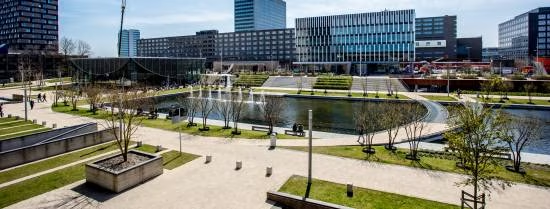Like many others around the globe, the Dutch universities are deeply concerned about the situation in Gaza and Israel. The horrific attack on 7 October, the uncertain fate of the Israeli hostages, the constantly escalating spiral of violence against the Palestinian civilian population: the images we are seeing shock us daily. We hope that it comes to an end very soon and that the good forces working for hope and peace may once again prevail, including in conflict zones elsewhere in the world.
The emotions that are widely spread within our academic community have been expressed to our institutions in many different ways, from open dialogue to loud protests. In recent weeks, a few such protests at universities have degenerated into occupations, provocations, violence and vandalism. We deeply regret this. However, the question behind all these protests is a legitimate one: how do we engage with our sister institutions in areas of major conflict?
Of course, we stand firmly behind the core values that are so fundamental to our society: freedom, justice and respect for human rights. But what makes universities such unique institutions is our commitment to academic freedom: the freedom to be able to research, reflect and debate, even if this clashes with our own and other people’s deepest convictions. Through academic collaboration, we share this core value of freedom with our partners, and we consider this an important channel to pursue dialogue about our fundamental core values with institutions where those values may be under pressure.
It is in precisely this moment that the academic freedom of individual academics and institutions is absolutely crucial. There are numerous ways in which the terrible conflict that is now taking place in Gaza can be viewed, weighed and interpreted by academics, politicians, citizens and involved parties: it has a history dating much further back than 7 October 2023 or even 15 May 1948. The members of our academic community who are currently expressing their opinions through demonstrations represent just one perspective on the conflict.
As a university, it is our task to give a voice to all the current perspectives on the conflict within the academic community. This is everything but an excuse to remain “neutral”. On the contrary. Providing our community with academic freedom to make their own considerations in that same freedom is one of our most important core values. In this, we wish to be anything but neutral.
We understand that this is not the answer that some wish to hear from us. But engaging in open, academic discussion and debate, precisely in this difficult, polarising time, is crucial for us. We wish to and shall consider our academic ties in freedom, at an institutional and individual level, just like we, as academic institutions, have been doing for decades and will continue to do.
If the values enshrined within the academic ethos – in which the possibility of open and academic debate is the minimum requirement – do not stand in the way of collaboration with Israeli and Palestinian universities, then we see no reason to reconsider or cut these ties. We find it important not to isolate critical Israeli academics, just as much as we are committed to supporting our Palestinian colleagues. We will only consider cutting ties with an entire country if the Dutch government strongly urges or advises us to do so, as was the case with Russia. But what we do expect is for collaboration to make it possible to conduct open and critical dialogue with one another.
Our support for the institutions of law and peace, which are located in our country, requires us to address our sister institutions whenever core values are transgressed or to distance ourselves from the collaboration if such dialogue does not appear possible. After all, we do not only have academic freedom, but also academic responsibility. To be able to take up this responsibility well, we carefully consider our collaborations and ties.
Dialogue between institutions and academics about often painful topics requires mutual recognition of the importance of this. Only this way will we remain in dialogue and will the route of academic diplomacy remain open – however, always with the protection of individual academic freedom in teaching and research. Even, and perhaps especially, if this becomes difficult or sometimes even painful.
The Rectores Magnifici of 15 Dutch universities
Wim van de Donk, Rector Magnificus of Tilburg University
Hester Bijl, Rector Magnificus of Leiden University
Peter-Paul Verbeek, Rector Magnificus of the University of Amsterdam
Theo Bastiaens, Rector Magnificus of the Open Universiteit
Carolien Kroeze, Rector Magnificus of Wageningen University & Research
Jacquelien Scherpen, Rector Magnificus of the University of Groningen
Silvia Lenaerts, Rector Magnificus of Eindhoven University of Technology
José Sanders, Rector Magnificus of Radboud University
Henk Kummeling, Rector Magnificus of Utrecht University
Joke van Saane, Rector Magnificus of the University of Humanistic Studies
Pamela Habibović, Rector Magnificus of Maastricht University
Annelien Bredenoord, Rector Magnificus of Erasmus University Rotterdam
Tom Veldkamp, Rector Magnificus of the University of Twente
Tim van der Hagen, Rector Magnificus of Delft University of Technology
Jeroen Geurts, Rector Magnificus of VU Amsterdam
- Related content

